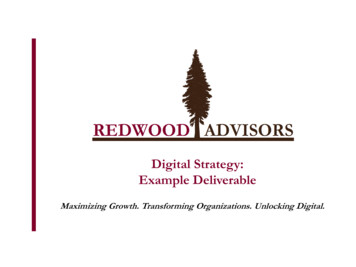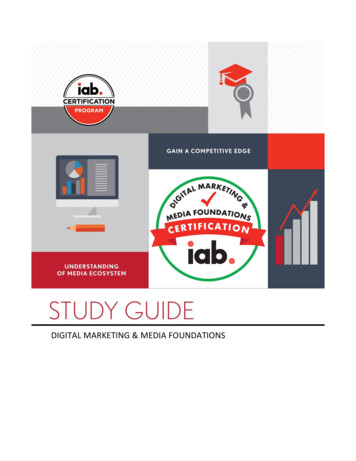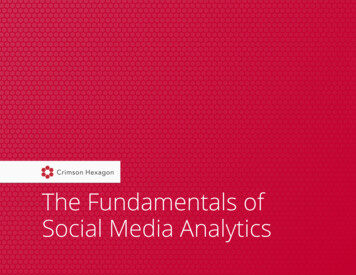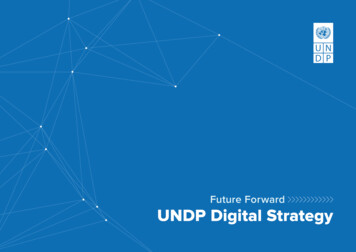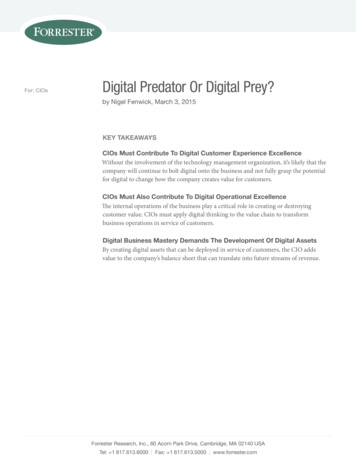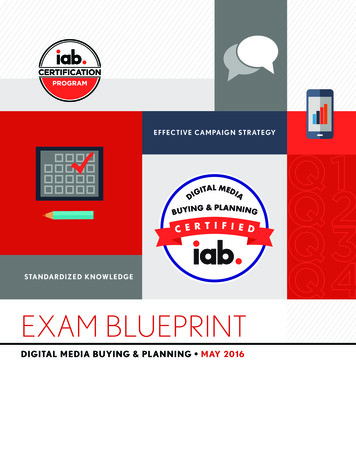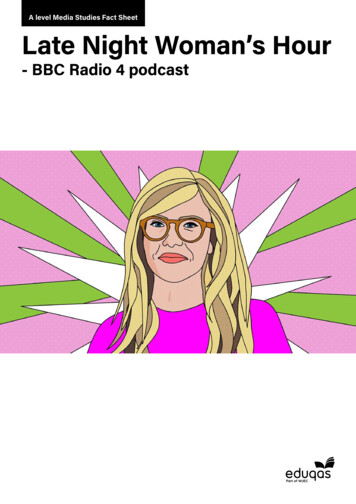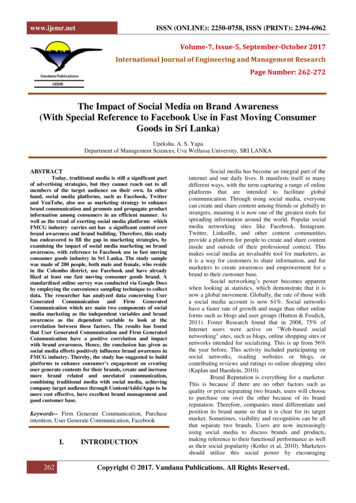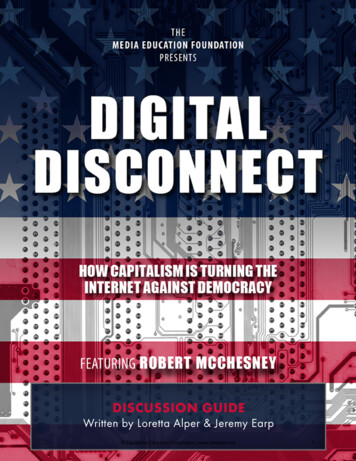
Transcription
DISCUSSION GUIDEWrittenbyLorettaAlper&JeremyEarp The Media Education Foundation www.mediaed.org1
ContentsA Note on This Guide . . 3Synopsis . 4About Robert McChesney . 5Pre-viewing Discussion Questions . . 6I. Introduction . 8Key PointsII. The Revolution . . 9Key PointsDiscussion QuestionsAssignmentsIII. Skeptics vs. Celebrants . 13Key PointsDiscussion QuestionsAssignmentsIV. The American Catechism . 16Key PointsDiscussion QuestionsAssignmentsV. Making the Internet Safe for Capitalism . 21Key PointsDiscussion QuestionsAssignmentsVI. The Rise of the Cartel . 26Key PointsDiscussion QuestionsAssignmentsVII. The Return of Big Brother 30Key PointsDiscussion QuestionsAssignmentsVIII. Journalism in the Age of the Algorithm . 35Key PointsDiscussion QuestionsAssignmentsIX. The Growing Resistance 40Key PointsDiscussion QuestionsAssignments The Media Education Foundation www.mediaed.org2
A Note on This GuideThis guide is designed to help teachers and screening organizers engagethe issues presented in the film Digital Disconnect, featuring RobertMcChesney. It opens with a set of general discussion questions designedto help open up conversation before screening the film, then provides aseries of key summary points, discussion questions, and writingassignments for each section of the film.We’ve organized this guide by section to make it easier for you to manageand engage the details of the film. For each section, you’ll find key pointsto help you and your students recall specific details during discussionsand writing assignments. You’ll find discussion questions designed toinspire critical thinking and open-ended conversation about the film'sspecific arguments. And you’ll find writing assignments that requirestudents to do further research and deepen their thinking about some ofthe major issues raised in the film.The overall goal of this guide is to help you initiate and facilitate openended discussions – and formulate writing assignments – that remainfocused on the actual issues and arguments raised in the film. The Media Education Foundation www.mediaed.org3
SynopsisDigital Disconnect trains its sights on the relationship between theinternet and democracy in the age of fake news, filter bubbles, andFacebook security breaches. Moving from the development of theinternet as a publicly funded project in the late 1960s to its full-scalecommercialization today, renowned media scholar Robert McChesneytraces how the democratizing potential of the internet has been radicallycompromised by the logic of capitalism and the unaccountable power ofa handful of telecom and tech monopolies. Along the way, McChesneyexamines the ongoing attack on net neutrality by telecom monopolies likeComcast and Verizon; explores how internet giants like Facebook andGoogle have amassed huge profits by surreptitiously collecting personaldata and selling it to advertisers; and shows how these companies haveroutinely colluded with the national security state to advance covert masssurveillance programs. Even more urgently, the film details how the riseof social media as a leading information source is working to isolatepeople into ideological filter bubbles and elevate fake news at the expenseof real journalism. While most debates about the internet continue tofocus on issues like the personal impact of internet addiction or thequestionable data-mining practices of individual companies likeFacebook, Digital Disconnect digs deeper to show how capitalism itselfis turning the internet against democracy. The result is an indispensableclassroom resource — a vital tool for helping students make sense of atechnological revolution that’s radically transforming virtually aspect ofhuman communication. The Media Education Foundation www.mediaed.org4
About Robert McChesneyRobert W. McChesney is the Gutgsell Endowed Professor in theDepartment of Communication at the University of Illinois at UrbanaChampaign. His work concentrates on the history and political economyof communication, emphasizing the role media play in democratic andcapitalist societies. In 2002 McChesney was the co-founder of Free Press,a national media reform organization. He also hosted the "Media Matters"weekly radio program on NPR-affiliate WILL-AM between 2002 and2012. From 1988 to 1998 he was on the Journalism and MassCommunication faculty at the University of Wisconsin-Madison, wherehe was selected as one of the top 100 classroom teachers. McChesney haswritten or edited twenty-seven books, including, most recently, PeopleGet Ready: The Fight Against a Jobless Economy and a CitizenlessDemocracy (co-authored with John Nichols); Dollarocracy: How theMoney-and Media Election Complex Is Destroying America (with JohnNichols); and Digital Disconnect: How Capitalism Is Turning theInternet Away from Democracy. In 2000, McChesney authored themultiple award-winning Rich Media, Poor Democracy: CommunicationPolitics in Dubious Times, which was reissued by The New Press in 2015with a new preface by the author. His work has been translated into 34languages. The Media Education Foundation www.mediaed.org5
Pre-viewing Discussion QuestionsTo get a discussion going before showing the film, ask students ormembers of your screening audience any or all of the following questions:1. When was the internet created? Who did the early work developingthe digital network that would eventually become the internet?2. When and how did the internet become part of ordinary people’severyday lives?3. How would you define the “internet revolution” or the “digitalrevolution”? Why do you think people have used the term“revolutionary” to describe this technology?4. Do you see the internet as a democratic space? As a tool fordemocracy? Explain how. If you don’t necessarily see the internet asa democratizing force, explain why not.5. What are some recent events and news stories that have shed light onthe relationship between the internet and democracy?6. What do you think is the average amount of time people spend online?Do you think you’re above or below the average? How much timewould you say you actually spend online during an average day?7. A lot of people would argue that capitalism, as a system, is the mostnatural economic expression of democracy and freedom. Do youagree with this? Why or why not?8. In your view, what is it about capitalism that might be beneficial to ademocratic political system? Do you think there’s anything about howcapitalism works that might pose a threat to democracy?9. Can you name the five most profitable companies in the world today?Do you know what these companies all have in common?10. How would you define a business “monopoly”? How about a“cartel”? In your view, are these two things good or bad for ademocracy? The answer might seem obvious, but give specifics. The Media Education Foundation www.mediaed.org6
11. What’s the FCC? What’s its main job? Who serves on the FCC? Howdo FCC commissioners get the job?12. Have you heard of “net neutrality”? If you’re familiar with theprinciple of net neutrality, are you in favor of it or opposed to it? Doyou know what the current rules around net neutrality are? Do youknow when these rules last changed? Do you know the official reasonsfor this change?13. What’s digital surveillance? Who’s behind this surveillance and howdoes it work exactly?14. What do you think of advertising on the internet? Do you find itannoying? Beyond the question of how annoying online ads can be,do you see any reason they might actually be dangerous todemocracy?15. In your opinion, all things considered, has the internet had a positiveor negative impact on our democracy? How about its impact onjournalism and the bedrock democratic ideal of a free press? The Media Education Foundation www.mediaed.org7
I. IntroductionKey Pointso Since it first started to come to public attention only two decades ago,the Internet has exploded in popularity and become a seamless part ofour daily lives, revolutionizing human communication in the process.o But while there’s general agreement that the internet hasrevolutionized human communication, there’s a lot less agreementabout whether this revolution has been good or bad for democracy.o At a time when the digital revolution has transformed virtually everyaspect of human communication – including the kinds of informationwe have access to as democratic citizens – it’s never been moreimportant to ask whether the internet is strengthening or weakeningour democracy. The Media Education Foundation www.mediaed.org8
II. The RevolutionKey Pointso Americans first started to be introduced to the high-speed digitalcomputer in the 1950s and 1960s.o At the time, computers were massive, intimidating machines housedin remote corporate and government settings, operated and understoodonly by experts.o Public discomfort with computers during this initial period wasreflected in popular culture at the time. Movies in the 1960s and ‘70scaptured deep-seated fears and anxieties about computers, especiallythe possibility that they might be used to control people.o In 1984, an ad introducing the Apple MacIntosh personal computerdepicted it as a force that would slay the scary Big Brother computertechnologies of the past and usher in an explicitly democratizingtechnological revolution.o When the internet took hold a few years later, the digital revolutionquickly swept the globe.o The number of people online around the world has skyrocketed fromaround 10 million people in 1995 to almost three and a half billionpeople today. In the US, the rate of growth has surged from just 14%of Americans online in 1995 to almost 90% today, with peoplespending on average about six hours a day online.o The result is an ever-expanding universe of data, billions upon billionsof text messages and photos and videos.o In total, it’s now estimated that 90% of all the data and informationever created in the history of the world has been created over just thelast two years.o The result is a communication revolution that McChesney says mayprove to be as transformative as the emergence of human speech andlanguage and the invention of the printing press. The Media Education Foundation www.mediaed.org9
o But despite the magnitude of this revolutionary transformation, there'sbeen very little agreement about whether this revolution has lived upto its democratic potential and been a truly democratizing force. The Media Education Foundation www.mediaed.org10
II. The RevolutionDiscussion Questions1. According to the film, what are some of the basic issues RobertMcChesney has been asking about media for years? Why doesMcChesney say these questions are especially crucial when it comesto the internet?2. What were computers like in the 1950s and ‘60s? How were theyviewed by the general public? What specific examples from Americanpop culture does the film use to show public attitudes towardcomputers? What do these examples reveal about public perceptions,according to McChesney?3. Describe the first Macintosh computer ad. When and where did itappear? What message did Apple and Steve Jobs seek to convey inthe ad about their new personal computer? According to the ad, howwould the Mac be different from previous computers and why wouldit matter?4. What happened to the use of computers once the internet took off? Inwhat fundamental way did the internet change how people had beenusing computers up to that point? What are some of the specific waysthe internet has revolutionized communication more generally,according to McChesney? What does he say about YouTube videosand how does his observation fit with his claim that the internet hassparked a revolution in communication?5. McChesney says that while there’s no doubt the internet hasrevolutionized communication, there’s less agreement about whetherit’s been a truly democratizing force. Before watching the nextsection, can you come up with some specific reasons people mightgive for why the internet has helped strengthen democracy? Howabout some reasons people might give to argue that the internet hasbeen bad for democracy? The Media Education Foundation www.mediaed.org11
II. The RevolutionAssignments1. As McChesney states at the outset, his work has focused largely onhow the commercial basis of our media system, and especially itscontrol by a shrinking number of corporations, have affected the kindsof information we receive. Write a paper examining who owns themajor media outlets in the US and how this ownership structure mightshape the kinds of information we receive as democratic citizens.Here are some good sources to get you started as you research thissubject:o “Media Consolidation” issue brief from media reformadvocacy group Free ol/mediaconsolidationo NPR’s current breakdown of the big broadcast, tech, andinternet d-their-many-brands-inone-charto CNN report on media concentration and related FCC lair-anchorpromos/index.html?iid surge-story-summary2. McChesney talks about the fears and anxieties people used to haveabout computers in the 1960s and ’70s, and how these attitudes werereflected in popular culture. Write a paper about public perceptions ofcomputers during this early period and examine the main reasonspeople seemed to be suspicious and frightened of computertechnology. Use examples from popular culture (movies, TV shows,science fiction writing, etc.) to ground your analysis.3. Research the amount of data and information the internet now makesavailable to anyone with an internet connection, and write a papercomparing it to the accessibility of information in the past. Be sure todiscuss how the internet’s revolutionary impact on information flowscompares to revolutionary communication technologies in the pastlike the invention of the printing press. The Media Education Foundation www.mediaed.org12
III. Skeptics vs. CelebrantsKey Pointso McChesney identifies the two major sides in debates about theinternet and democracy as the “celebrants” and the “skeptics.”o Some internet skeptics have argued that the sheer amount ofinformation available on the internet has undermined our ability tothink and process information at the level required of citizens indemocratic societies.o Other skeptics have argued that the internet has undermined thedemocratic process itself by spreading fake election news andundermining political journalism.o On the other side of the debate, internet celebrants have typicallyargued that the internet has empowered ordinary citizens to becomeparticipants in the democratic process by giving them unprecedentedaccess to unprecedented amounts of information.o Celebrants point to numerous examples of the democratizing potentialof the internet, including its use by millions of people during the ArabSpring in 2011 to bypass and bring down an authoritarian regime, andthe use of smart phones and social media to document civil rightsviolations and police violence in the US.o Celebrants have also claimed that the internet is making electoralpolitics more accessible, citing the use of social media by candidatesfrom both parties during the 2016 election.o According to McChesney, the arguments that have been raised inthese debates have been interesting, and important, but haven’t takena sustained and deep enough look at the economic forces that haveshaped the internet.o In McChesney’s view, it’s not possible to understand the relationshipbetween the internet and democracy without first taking into accountthe relationship between capitalism and democracy. The Media Education Foundation www.mediaed.org13
III. Skeptics vs. CelebrantsDiscussion Questions1. Briefly summarize the contrasting positions of internet skeptics andcelebrants. What are some of the main differences between them onthe question of the internet and democracy?2. What are some of the main examples the film gives to represent eachside in this debate? Can you think of other examples to support eachof these sides?3. If you had to choose, would you consider yourself more of an internetcelebrant or a skeptic? On balance, do you think the internet doesmore to help or hurt democracy? Explain your reasoning.4. What’s McChesney’s critique of most debates surrounding theinternet and democracy? What’s his issue with the way the debate hasbeen framed and why does he say it matters?5. Why do you think there’s been relatively little attention paid to howcapitalism itself has shaped the internet and in turn the web’srelationship to democracy? The Media Education Foundation www.mediaed.org14
III. Skeptics vs. CelebrantsAssignments1. Take a position in the debate McChesney lays out between celebrantsand skeptics and write a paper making your case one way or the other.Focus specifically on whether you think the internet has been more ofa democratizing or anti-democratic force. To support and advanceyour position, cite specific passages from the film. Also do someadditional outside research on the people featured in the film –including Nicholas Carr, Thomas Crampton, Sherry Turkle, JimmyWales, and any other major celebrants or skeptics you come across inyour research – and draw on their ideas as well.2. Research the Arab Spring and write a paper examining the role theinternet and social media seemed to play in this democratic uprising.How, exactly, was social media used? And what was the ultimateresult of the uprising?3. Write a paper examining the role smart phones and social media haveplayed in shining a light on police violence. Does your research intothis subject make you more or less likely to see the internet as ademocratizing force? Be sure to explain your position clearly, and touse specific examples from the film.4. Write a paper examining the role social media played during the 2016presidential election and explain whether you think it was ultimatelygood or bad for the democratic process. Cite sources from the film,and from your own additional research, to support your argument. The Media Education Foundation www.mediaed.org15
IV. The American CatechismKey Pointso In the US, the traditional story that’s been told about capitalism is thatit’s a system that allows entrepreneurs to compete on a level playingfield to the benefit of consumers.o It’s also a story that says capitalism and democracy go hand in hand– and that capitalism is in effect the natural economic expression ofdemocracy and freedom.o But in reality, McChesney argues, there’s no necessary correlationbetween democracy and capitalism at all, and capitalism in fact oftenposes a threat to democracy.o There have been many societies that have been economicallyorganized around private property and markets, but politically havebeen dictatorships. And within capitalist societies like the US,capitalism and democracy often exist in tension with one another.o One reason for the tension between capitalism and democracy is thatinequality is built into the very structure of the capitalist system.o Another reason for the tension between capitalism and democracy isthat without government regulation, capitalism tends to createbusiness monopolies that give inordinate power and advantage to afew massive corporations.o The power of these monopolies can be detrimental to the smoothfunctioning of the democratic system because it means that a few giantcompanies end up with way more influence over government policythan ordinary people.o An exhaustive Princeton University study showed that despitedemocratic rhetoric to the contrary, ordinary Americans have virtuallyno influence over policy decisions and that corporations dominate thelegislative process. The Media Education Foundation www.mediaed.org16
o With these economic power dynamics in mind, McChesney arguesthat if we want to understand whether the internet is good or bad fordemocracy we first need to ask whether the internet has helped to pushback against the lopsided influence of business monopolies andcorporate interests and level the playing field for ordinary Americans.o And he suggests that even a quick glance at business media in the USprovides an obvious answer to this question: that instead of disruptingthe anti-democratic tendencies of monopolies, the Internet has turnedout to be the greatest generator of monopoly in the history ofcapitalism.o The five most valuable corporations in the world today are internetmonopolies – Apple, Google, Microsoft, Facebook, and Amazon.o In addition, a relatively small number of commercial websites nowattract the overwhelming volume of traffic, making the internet anincreasingly unequal playing field.o Moreover, this same handful of firms now gets the lion’s share of allonline advertising revenue -- with Google and Facebook, alone, nowaccounting for the vast majority of all advertising revenue.o What’s crucial to remember, McChesney says, is that the unequal,monopoly-ruled internet landscape that exists today didn’t justdevelop on its own, organically, but is instead the product of a seriesof very deliberate policy decisions that served specific interests atspecific moments in time. The Media Education Foundation www.mediaed.org17
IV. The American CatechismDiscussion Questions1. What’s the traditional story that’s been told about Americancapitalism? Why do you think McChesney calls this story “TheAmerican catechism”? What is a “catechism” anyway? And how doesit apply here?2. According to McChesney, how closely does this theoretical storyabout capitalism match up with the way capitalism operates in the realworld? What specific examples does McChesney give to support hisargument that in reality there’s no necessary correlation betweencapitalism and democracy? Can you think of other examples?3. Why does McChesney say that capitalism is often at odds withdemocracy? What are the two main examples he gives to make hiscase? Do you think he makes a convincing argument? Why or whynot?4. What is a “monopoly”? And according to McChesney, why arebusiness monopolies inherently anti-democratic? In what way domonopolies limit the functioning of democratic societies? And howhave they been dealt with in the past?5. According to McChesney, has the internet helped to push back againstthese anti-democratic tendencies of capitalism? If so, how? If not,what’s the main evidence he gives to make his case? The Media Education Foundation www.mediaed.org18
IV. The American CatechismAssignments1. Do you agree or disagree with McChesney’s assertion that there’s nonecessary correlation between capitalism and democracy? Take noteson the major reasons McChesney gives to make his case, then write apersuasive essay weighing in on this question yourself. Your job hereis to argue either of the following:a. Capitalism often operates without regard for democracy atall and in fact can be hostile to basic democratic principles.b. Capitalism is, in fact, a natural corollary to democraticpolitical systems and exists more or less in harmony withit.Be sure to summarize McChesney’s key arguments on this issuebefore doing your own research and writing a defense or critique ofhis arguments.2. Research economic inequality in the United States. Go online and findthe latest information and data on inequality from credible sources.Then write a paper summarizing your findings and explaining whetheror not you see these trends as a threat to democracy. If not, explainwhy not. If so, explain why you came to that conclusion. Also explainsome of the specific ways that class and inequality might come intoplay in politics and affect the functioning of democracy?3. Read the full Princeton study by Martin Gilens and Benjamin Pagethat McChesney cites in the film. Write a paper summarizing its majorfindings. Then explain what these findings seem to tell us about howmoney affects the state of our democracy.You can find the study iles/mgilens/files/gilens and page 2014 -testing theories of american politics.doc.pdf The Media Education Foundation www.mediaed.org19
4. McChesney argues that far from leveling the economic playing fieldand pushing back against the power of monopolies, the internet hasbeen the greatest generator of monopolies in the history of capitalism.Research how the economic power of Standard Oil in the 1890s led tomonopoly charges and anti-trust legislation. Then write a papercomparing that history with the charges today that Google andFacebook are monopolies on the same scale of Standard Oil all thoseyears ago. What did the government end up doing to Standard Oil andother monopolies like it? What role has government played inaddressing the new internet monopolies? As you write up yourfindings, be sure first to clearly define and explain what a business“monopoly” is, what “anti-Trust” legislation is, and why for decadeseconomists have seen monopolies as a threat to both capitalism anddemocracy.5. Read this New York Times story from 2017 about the EU’s antitrustcase against gy/eu-googlefine.htmlThen read this follow-up piece from Reuters about the outcome of QYWrite a paper summarizing the facts of this case. Then give your owntake on whether you think governments should be exercising moreregulatory power over internet monopolies to achieve balance andprotect the public interest. Be sure to think about and address thesequestions: What kind of power do governments have to address theanti-competitive practices of tech and telecoms giants? What are thelimits? Why is it so difficult to successfully challenge the monopolypower of a company like Google once it achieves market dominance?Do you favor the need for government intervention in the market toregulate and even fine companies that become monopolies? Or do yousee monopolies as a natural consequence of capitalism that should beleft to the marketplace? The Media Education Foundation www.mediaed.org20
V. Making the Internet Safe for CapitalismKey Pointso The internet began in 1969 as an experimental networking projectcalled the ARPANET, a series of interconnected networks built toallow computers to communicate directly with one another.o The ARPANET project not only laid the foundations for today’sinternet, it was also funded entirely by the federal government: thefederal government spent hundreds of millions of dollars in taxpayermoney on the project over a period of decades while US corporationsinvested and risked nothing.o At the same time, many of the people who helped develop the Internetcame out of the left-wing counter-culture of the 60's and 70's. In fact,Silicon Valley in the '70s was full of programmers and hackers whowere committed to taking computers out of the hands of top-downcorporations and opening up a democratic space free of commercialinfluence.o And throughout the 1970s and much of the 1980s, federal policy alsosaw the internet as a public resource and a public good, explicitlyprohibiting the use of the internet for commercial purposes.o That all started to change when the internet was up and runningsmoothly in the 1990s, and corporations finally started to see somecommercial value in it.o In the early ‘90s, thanks to American political leaders of both partiesand without public debate, Congress passed legislation that more orless handed the internet over to commercial interests.o The key rationale political leaders gave for commercializing theinternet was that it would open up competition and spur innovationand economic growth, all to the benefit of democracy and theAmerican people. The Media Education Foundation www.mediaed.org21
o This rationale seemed to be validated when the American economysuddenly began to boom in the mid-1990s after several years ofrecession, powered by explosive growth in internet stock values.o But it would turn out that what was being hyped as a greatdevelopment for the American people wasn’t viewed so positively bythe phone and cable monopolies at the time. The Media Education Foundation www.mediaed.org22
V. Making the Internet Safe for CapitalismDiscussion Questions1. What was the ARPANET? Why was it launched, for what specificpurposes, and who was behind it?2. What role did private corporations play in building the internet fromthe ground up until the 1990s? What role did the government – andpublic, taxpayer money – play in building the internet from scratch?3. How did government policy shape the direction of the internet untilthe early 1990s? When and how did government policy change? Whatwere the main reasons given for this change? And what role did thepublic have in these decisions?4. Why does McChesney quote internet entrepreneur Mark Andreessen?What’s the basic point Andreessen was making in this quote and whydoes McChesney think it’s important? How does Andreessen’sattitude relate to the overall question of the internet and democracyaddressed in the film?5. Why did the economic recovery of the 1990s seem to validatearguments that were made in favor of commercializing the internet? The Media Education Foundation www.mediaed.org23
V. Making the Internet Safe for CapitalismAssignments1. Read or watch Vice President Al Gore’s full speech about the NationalInformation Infrastructure, which laid out the Clinton-Goreadministration’s vision for the future of the internet. Write a paperdetailing the key rationales Gore gave for why the
Digital Disconnect trains its sights on the relationship between the internet and democracy in the age of fake news, filter bubbles, and Facebook security breaches. Moving from the development of the internet as a pu

